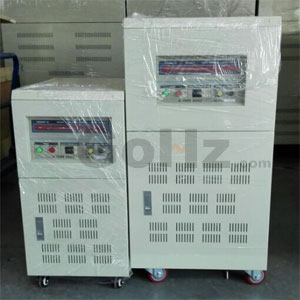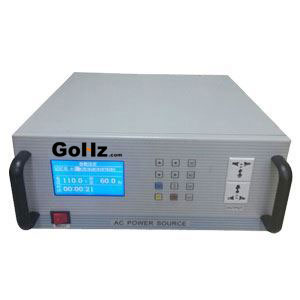What happens if 50Hz motor is driven at 60Hz?
For the same motor all the parameters are constant except the frequency and this will affect the applied voltage, so simply apply this equation and see what will happen:
This is the new required voltage to be applied to get the same motor duty as before.
As you see the voltage should raise to get also the same power as before, if not the motor will consume more current and become hotter. I mean you can imagine if you have a motor running on less voltage of what is recorded on his nameplate, what will happen to it? This is exactly what will happen in this case.
It will run with following problems for a 50Hz motor running on 60Hz:
We know synchronous speed of motor is directly proportional to frequency so for 50 Hz machine when operated in 60 Hz it speed will increase and motor would try to catch up that speed for which more current will be drawn. And also motor needs to maintain constant V/Hz ratio which has got limitation of increasing voltage and frequency above which the flux will be saturated leading to more iron losses which will generate noise increase eddy current loss and force in the winding also gets increased which may lead to serious damage and also due to increase in voltage level insulation may get failure. In summary I would like to say initial operation wouldn't be dangerous but increasing its duty may lead to heating of motor and finally decrease its life due to losses.
V1/f1=V2/f2, V1=400v (for example), andThen, the new voltage to be applied V2= 400x60/50=480v.
f1= 50Hz,
f2=60Hz.
This is the new required voltage to be applied to get the same motor duty as before.
As you see the voltage should raise to get also the same power as before, if not the motor will consume more current and become hotter. I mean you can imagine if you have a motor running on less voltage of what is recorded on his nameplate, what will happen to it? This is exactly what will happen in this case.
It will run with following problems for a 50Hz motor running on 60Hz:
- The core loss will increase and cause over heating of core.
- As the core loss will increase, the Power Factor of motor will reduce.
- The motor speed will be higher, so shaft load will increase. Motor will be overloaded at rated load.
- Motor will produce magnetic humming sound.
- Motor Bearing life will be reduced (marginal) for more speed and more load.
- Dielectric Stress on insulation will increase due to higher frequency, causes marginal reduction of life of motor insulation.
We know synchronous speed of motor is directly proportional to frequency so for 50 Hz machine when operated in 60 Hz it speed will increase and motor would try to catch up that speed for which more current will be drawn. And also motor needs to maintain constant V/Hz ratio which has got limitation of increasing voltage and frequency above which the flux will be saturated leading to more iron losses which will generate noise increase eddy current loss and force in the winding also gets increased which may lead to serious damage and also due to increase in voltage level insulation may get failure. In summary I would like to say initial operation wouldn't be dangerous but increasing its duty may lead to heating of motor and finally decrease its life due to losses.
Post a Comment:
You may also like:
50Hz 60Hz Frequency Converter Setting
Using GoHz frequency converter to
Or customize your own converters.
- Convert 220v 50Hz to 110v 60Hz,
- Convert 120v 60Hz to 230v 50Hz,
- Convert 110v 60Hz to 240v 50Hz,
- Convert 480v 60Hz to 380v 50Hz,
- Convert 400v 50Hz to 460v 60Hz,
- Convert 240v 60Hz to 380v 50Hz,
Or customize your own converters.
Featured Articles
460v 60Hz motor on 400v 50Hz power ...
 Often the European motors at 1hp size are universal for 50Hz or 60Hz power supply, as long as you have 400V x 50Hz and 460V x ...
Often the European motors at 1hp size are universal for 50Hz or 60Hz power supply, as long as you have 400V x 50Hz and 460V x ...
 Often the European motors at 1hp size are universal for 50Hz or 60Hz power supply, as long as you have 400V x 50Hz and 460V x ...
Often the European motors at 1hp size are universal for 50Hz or 60Hz power supply, as long as you have 400V x 50Hz and 460V x ...Convert 220v, 230v, 240v 50Hz to 110v, ...
 When you buy an 110v (120v) 60Hz appliance from USA, and run it on 220v (230v, 240v) 50Hz country (i.e. UK, Australia, ...
When you buy an 110v (120v) 60Hz appliance from USA, and run it on 220v (230v, 240v) 50Hz country (i.e. UK, Australia, ...
 When you buy an 110v (120v) 60Hz appliance from USA, and run it on 220v (230v, 240v) 50Hz country (i.e. UK, Australia, ...
When you buy an 110v (120v) 60Hz appliance from USA, and run it on 220v (230v, 240v) 50Hz country (i.e. UK, Australia, ...60Hz motor running on 50Hz power ...
 Electric motors, both single and three phase, are designed for running on a specified power frequency. But sometimes we may use a ...
Electric motors, both single and three phase, are designed for running on a specified power frequency. But sometimes we may use a ...
 Electric motors, both single and three phase, are designed for running on a specified power frequency. But sometimes we may use a ...
Electric motors, both single and three phase, are designed for running on a specified power frequency. But sometimes we may use a ...